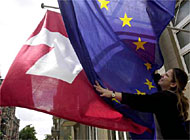Switzerland lays groundwork for future EU relations

Officials from Switzerland and the European Union have announced they plan to continue talks on new bilateral treaties as early as next month. The Swiss are seeking to join the EU's Schengen Agreement, while Brussels wants further cooperation on cross-border fraud and tax evasion.
The announcement came following preliminary talks between the two groups in Brussels on Friday.
The Swiss have made it clear since February that they want to be party to the full Schengen and Dublin agreements, which are chiefly concerned with border and asylum issues.
The negotiators are seeking to exploit a window of opportunity for new bilateral negotiations which opened at the end of last year when the European Commission requested that Bern cooperate in the fight against cross-border fraud.
Officials said they plan to decide, over the course of the next few days, when exactly the next round of talks will take place. It is expected that they will meet again by early April.
In the past month, discussions at a technical level have been held on fraud and tax evasion issues, as well as the so-called “left-overs” from a previous round of bilateral talks. Preliminary talks on the Schengen and Dublin agreements were also held on Switzerland’s initiative.
Friday’s talks aimed to combine the various issues for the first time. Michael Ambühl, head of the foreign ministry’s integration office, represented Switzerland, which would like to see a negotiation “package” emerge from the talks.
The Schengen agreement, which has been signed by a majority of EU member states, abolished border controls between its members. It also provides for common policies to fight crime, as well as a joint system of investigation and information.
The Dublin agreement is a separate but related treaty focused on a common visa policy, which will be needed once border controls have been abolished.
It also stipulates which member state is responsible for deciding on asylum requests, thus making it impossible for asylum seekers to lodge second and third requests with other EU members.
Both the Schengen and Dublin agreements, which came into force as separate inter-governmental treaties in 1991 and 1997 respectively, have since been incorporated into the EU’s Amsterdam Treaty.
EU diplomats have reportedly expressed surprise that Switzerland is so keen to sign up to the two treaties.
Swiss press reports this week quoted EU officials as saying that, if Switzerland were to become an associate to the agreements, it would have to accept any and all future additions to them, without having a say in the consultation process because it is not an EU member.
Swiss diplomats argue that their strategy is based on common sense. “The alternative would be that we conclude separate bilateral agreements in the areas covered by the Schengen and Dublin agreements, and that’s a cumbersome path”, said a diplomat involved in the negotiations.
They admit, too, that Switzerland would like to shed its reputation for intransigence in its dealings with the EU. “We want to get rid of the image of cherry-picking,” as one official put it.
That is likely to prove difficult, though, because whatever the negotiators ultimately agree in Brussels, they will still have to sell it to the cantons and the Swiss public.
The government in Bern is already facing scepticism at home over its policy towards Schengen. Beat Hegg, secretary of the conference of cantonal justice and police ministries, told swissinfo that the cantons were “uneasy” at being left out of the negotiations at this early stage.
“Cantons have a right, enshrined in the constitution, to be heard on matters of foreign policy if their interests are concerned”, Hegg said. He emphasised that “Schengen” was an obvious case, and cited the collaboration of cantonal police authorities with immigration officers as an example.
Some observers doubt that a bilateral agreement with full accession to the Schengen and Dublin treaties could succeed in a referendum in euro-sceptical Switzerland.
“The bilateral path is deadlocked”, wrote the Zurich-based “Tages-Anzeiger” newspaper after a recent vote, in which the public overwhelmingly rejected immediate negotiations on full membership in the EU.
by Markus Haefliger

In compliance with the JTI standards
More: SWI swissinfo.ch certified by the Journalism Trust Initiative
You can find an overview of ongoing debates with our journalists here. Please join us!
If you want to start a conversation about a topic raised in this article or want to report factual errors, email us at english@swissinfo.ch.